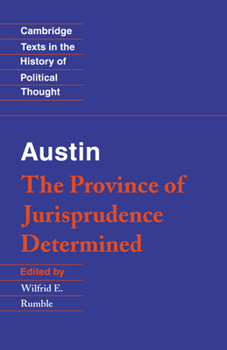Austin: The Province of Jurisprudence Determined
Select Format
Select Condition 
Book Overview
The Province of Jurisprudence Determined (1832) is a classic of nineteenth-century English jurisprudence, a subject on which Austin eventually had a profound impact. This edition includes the complete and unabridged text of the fifth (1885) and last edition. The comprehensive introduction discusses Austin's life, the main themes of his book, leading criticisms of his ideas, and recent interpretations of his legal philosophy. A bibliography and biographical synopses of the principal figures mentioned in the text are also included.
Format:Paperback
Language:English
ISBN:0521447569
ISBN13:9780521447560
Release Date:March 1995
Publisher:Cambridge University Press
Length:344 Pages
Weight:1.05 lbs.
Dimensions:0.8" x 5.5" x 8.5"
Customer Reviews
1 rating
One of the "founders" of "legal positivism"
Published by Thriftbooks.com User , 16 years ago
I read this book for a class on the philosophy of law. The English legal philosopher and jurist, John Austin, was instrumental in developing the theory of legal positivism, which held that there had to be a separation between religious laws of morality and positive or human made law. In his book "The Provence of Jurisprudence Determined," he delineates how laws are made and obeyed. "Every positive law, or every law simply and strictly so called, is set, directly or circuritously, by a sovereign person or body, to a member or members of the independent political society wherein that person or body is sovereign or supreme" (253-254). Therefore, in a representative democracy, the people are the sovereign and either they or their elected representatives produce the laws. Austin argued against judges interpreting their nation's constitution or law code to make perceived necessary changes to keep up with changing social values. Austin believes that in a democratic society, the people are sovereign and thus a nation's constitution and law code should be changed by the people's elected representatives and not by appointed judges. Austin is not against citizens changing their Constitution or laws, "... the Constitution should keep up to date--but it should keep up to date with the views of the people." Austin's genius was in his perception of the history of how nations govern, which has provided ample proof that there is a direct correlation between those democracies that maintain a healthy balance of powers between the branches of government and are the same democracies that are most protected from the danger of slipping into tyranny; whether it is rule by a dictator or rule by a politically privileged few, such as an oligarchy. Recommended reading for those interested in philosophy, history, and political science.





